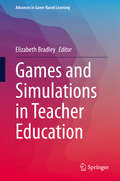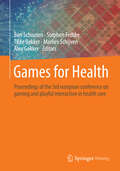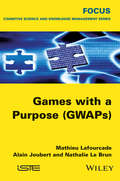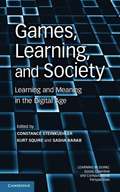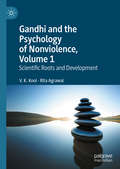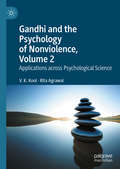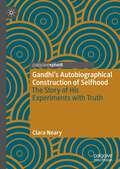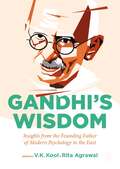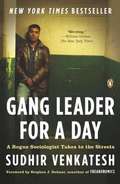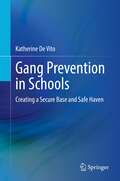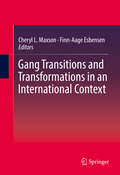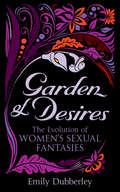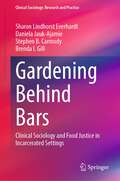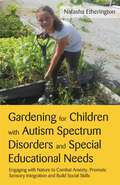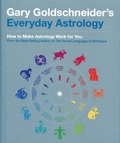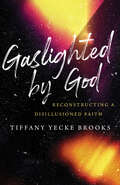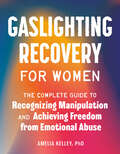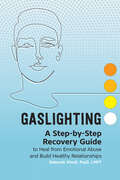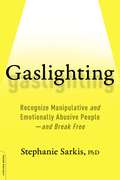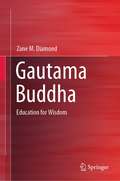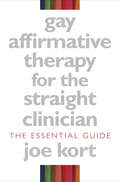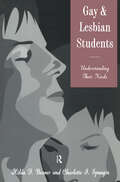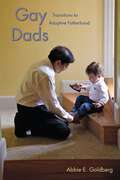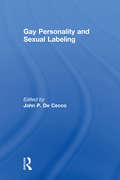- Table View
- List View
Games and Simulations in Teacher Education (Advances in Game-Based Learning)
by Elizabeth BradleyThis book includes more than twenty computer games and simulations for use in teacher training. Each of these simulations is innovative and presents an opportunity for pre-service teachers to have hands-on experience in an area of need prior to teaching in the classroom. Information on the simulation origins, including theoretical underpinnings, goals, characteristics, relevant research/program evaluation results, discussion of benefits and limitations as well as dissemination, recommended use, scope of practice, etc. of each game or simulation are included. Pre-service and new teachers will gain a number of useful skills through completion of these simulations and higher education faculty and administrators will gain a plethora of research-based and effective training tools for use in their teacher training programs.
Games for Health
by Ben Schouten Stephen Fedtke Tilde Bekker Marlies Schijven Alex GekkerFounded in 2004, the Games for Health Project supports community, knowledge and business development efforts to use cutting-edge games and game technologies to improve health and health care. The Games for Health Conference brings together researchers, medical professionals and game developers to share information about the impact of games, playful interaction and game technologies on health, health care and policy. Over two days, more than 400 attendees participate in over 60 sessions provided by an international array of 80+ speakers, cutting across a wide range of activities in health and health care. Topics include exergaming, physical therapy, disease management, health behavior change, biofeedback, rehab, epidemiology, training, cognitive health, nutrition and health education.
Games with a Purpose (GWAPS)
by Mathieu Lafourcade Nathalie Le Brun Alain JoubertHuman brains can be seen as knowledge processors in a distributed system. Each of them can achieve, conscious or not, a small part of a treatment too important to be done by one. These are also "hunter / gatherers" of knowledge. Provided that the number of contributors is large enough, the results are usually better quality than if they were the result of the activity of a single person, even if it is a domain expert. This type of activity is done via online games.
Games, Learning, and Society
by Sasha Barab Kurt Squire Constance SteinkuehlerThis volume is the first reader on video games and learning of its kind. Covering game design, game culture and games as twenty-first-century pedagogy, it demonstrates the depth and breadth of scholarship on games and learning to date. The chapters represent some of the most influential thinkers, designers and writers in the emerging field of games and learning - including James Paul Gee, Soren Johnson, Eric Klopfer, Colleen Macklin, Thomas Malaby, Bonnie Nardi, David Sirlin and others. Together, their work functions both as an excellent introduction to the field of games and learning and as a powerful argument for the use of games in formal and informal learning environments in a digital age.
Gandhi and the Psychology of Nonviolence, Volume 1: Scientific Roots and Development
by Rita Agrawal V. K. KoolThe first of two volumes, this book examines Gandhi’s contribution to an understanding of the scientific and evolutionary basis of the psychology of nonviolence, through the lens of contemporary researches on human cognition, empathy, morality and self-control.While, psychological science has focused on those participants that delivered electric shocks in Professor Stanley Milgram’s famous experiments, these books begin from the premise that we have neglected to fully explore why the other participants walked away. Building on emergent research in the psychology of self control and wisdom, the authors illustrate what Gandhi’s life and work offers to our understanding of these subjects who disobeyed and defied Milgram.The authors analyze Gandhi’s actions and philosophy, as well as original interviews with his contemporaries, to elaborate a modern scientific psychology of nonviolence from the principles he enunciated and which were followed so successfully in his Satyagrahas. Gandhi, they argue, was a practical psychologist from whom we can derive a science of nonviolence which, as Volume 2 will illustrate, can be applied to almost every subfield of psychology, but particularly to those addressing the most urgent issues of the 21st century. This book is the result of four decades of collaborative work between the authors. It marks a unique contribution to studies of both Gandhi and the current trends in psychological research that will appeal in particular to scholars of social change, peace studies and peace psychology, and, serve as an exemplar in teaching one of modern psychology’s hitherto neglected perspectives.
Gandhi and the Psychology of Nonviolence, Volume 2: Applications across Psychological Science
by Rita Agrawal V. K. KoolIn volume 1 of Gandhi and the Psychology of Nonviolence the authors advanced a scientific psychology of nonviolence, derived from principles enunciated by Gandhi and supported by current state-of-the-art research in psychology. In this second volume the authors demonstrate its potential contribution across a wide range of applied psychology fields. As we enter the era of the Anthropocene, they argue, it is imperative to make use of Gandhi’s legacy through our evolving noospheric consciousness to address the urgent problems of the 21st century. The authors examine Gandhi’s contributions in the context of both established areas such as the psychology of religion, educational, community and organizational psychology and newer fields including environmental psychology and the psychology of technology. They provide a nuanced analysis which engages with both the latest research and the practical implications for initiatives like the Intergovernmental Panel on Climate Change and the UN’s Sustainable Development Goals.The book concludes with an overview of Gandhi’s contribution to modern psychology, which encompasses the history, development, and current impetus behind emerging work in the field as a whole. It marks an exciting contribution to studies of both Gandhi and psychology that will also provide unique insights for scholars of applied psychology, education, environmental and development studies.
Gandhi’s Autobiographical Construction of Selfhood: The Story of His Experiments with Truth
by Clara NearyThis book addresses the topics of autobiography, self-representation and status as a writer in Mahatma Gandhi's autobiographical work The Story of My Experiments with Truth (1927, 1929). Gandhi remains an elusive figure, despite the volumes of literature written on him in the seven decades since his assassination. Scholars and biographers alike agree that “no work on his life has portrayed him in totality” (Desai, 2009), and, although “arguably the most popular figure of the first half of the twentieth century” and “one of the most eminent luminaries of our time,” Gandhi the individual remains “as much an enigma as a person of endless fascination” (Murrell, 2008). Yet there has been relatively little scholarly engagement with Gandhi’s autobiography, and published output has largely been concerned with mining the text for its biographical details, with little concern for how Gandhi represents himself. The author addresses this gap in the literature, while also considering Gandhi as a writer. This book provides a close reading of the linguistic structure of the text with particular focus upon Gandhi’s self-representation, drawing on a cognitive stylistic framework for analysing linguistic representations of selfhood (Emmott 2002). It will be of interest to stylisticians, cognitive linguists, discourse analysts, and scholars in related fields such as Indian literature and postcolonial studies.
Gandhi’s Wisdom: Insights from the Founding Father of Modern Psychology in the East
by V. K. Kool Rita AgrawalThis book examines what Gandhian thought contributes to the conceptualisation of wisdom and its application in the 21st Century. It draws together leading international researchers and practitioners to combine an in-depth understanding of Gandhi’s philosophy with the latest research from psychology and allied social sciences. Beginning with an overview of wisdom in the domain of scientific research and as it is understood in our everyday life, the book’s editors further call attention to key cross cultural issues limiting its current scope. Amongst the topics explored are Gandhi’s silence, fasting, vows, self-efficacy, self-control, and more, illustrating what he offers not only to the study of wisdom within psychology, but across a broad range of disciplines and professional enterprises. It is invaluable to students and scholars of Gandhian studies, the psychology of wisdom, management and peace psychology; as well to readers with a general interest in the application of Gandhi’s wisdom today.
Gang Leader for a Day
by Sudhir VenkateshA New York Times BestsellerForeword by Stephen J. Dubner, coauthor of FreakonomicsWhen first-year graduate student Sudhir Venkatesh walked into an abandoned building in one of Chicago's most notorious housing projects, he hoped to find a few people willing to take a multiple-choice survey on urban poverty--and impress his professors with his boldness. He never imagined that as a result of this assignment he would befriend a gang leader named JT and spend the better part of a decade embedded inside the projects under JT's protection. From a privileged position of unprecedented access, Venkatesh observed JT and the rest of his gang as they operated their crack-selling business, made peace with their neighbors, evaded the law, and rose up or fell within the ranks of the gang's complex hierarchical structure. Examining the morally ambiguous, highly intricate, and often corrupt struggle to survive in an urban war zone, Gang Leader for a Day also tells the story of the complicated friendship that develops between Venkatesh and JT--two young and ambitious men a universe apart."Riveting." --The New York Times"Compelling... dramatic... Venkatesh gives readers a window into a way of life that few Americans understand." --Newsweek"An eye-opening account into an underserved city within the city." --Chicago Tribune"The achievement of Gang Leader for a Day is to give the dry statistics a raw, beating heart." --The Boston Globe"A rich portrait of the urban poor, drawn not from statistics but from viivd tales of their lives and his, and how they intertwined." --The Economist"A sensative, sympathetic, unpatronizing portrayal of lives that are ususally ignored or lumped into ill-defined stereotype." --Finanical TimesSudhir Venkatesh's latest book Floating City: A Rogue Sociologist Lost and Found in New York's Underground Economy--a memoir of sociological investigation revealing the true face of America's most diverse city--was published in September 2013 by The Penguin Press
Gang Prevention in Schools: Creating a Secure Base and Safe Haven
by Katherine De VitoThis book delves deep into the hidden population of former gang members who share their positive and negative experiences of being gang members. Their stories of violence, hopelessness, despair, and loneliness also offer a seed of hope – they contain the building blocks for prevention. By understanding why they each turned to gangs, how they turned to gangs, and what went wrong for some along their pathways during childhood, as well as how and why they chose to leave the gang lifestyle, we can begin to put the pieces together and understand tools for gang prevention. Schools are in the unique position to become an oasis or a safe haven for a child in a world that does not otherwise feel safe to them. School staff members can step in and become consistent people in a child’s life. They can help to identify at-risk youth and intervene, facilitating a change in path away from gang membership. This book discusses how schools and staff can be instrumental in gang prevention and outlines warning signs and risk and protective factors for gang involvement. It also talks about components of gang prevention programs in schools. Additional topics explored include: Theories of Gang InvolvementLack of Family Consistency: Relating Attachment Theory with Gang Involvement“Brotherhood, Sisterhood, Unity:" Gangs as Replacement Family"No Other Option:" The Role of Social Environment "Death, Jail, or a Turnaround:" Making the Decision to DisengageA Piece About Trauma-Informed PracticeAuthored by a school social worker who has an insider's perspective on working in a school, Gang Prevention in Schools is a useful resource that gives a humanistic view of former gang members. The book will engage readers in the fields of psychology, social work, education and educational administration, and criminal justice, as well as have potential appeal to a lay audience due to the richness of the stories and interviews.
Gang Transitions and Transformations in an International Context
by Finn-Aage Esbensen Cheryl L. MaxsonThis unique volumeexplores why and how youth join and leave gangs, as a lens for exploringintervention and prevention through comparative, international research. The book explores three key questions: how doyouth gangs form and how do they change over time? Why do youth join streetgangs, and why do they leave? How can we use this knowledge to foster moreeffective interventions for gang problems?Drawing from research conducted in tendifferent countries (Belgium, Canada, Germany, Israel, the Netherlands, Norway, Sweden, the United Kingdom, the United States of America, and Venezuela)and a variety of disciplines, sixteenoriginal chapters provide unique insights into: 1) patterns of gangparticipation and how it impacts individual behavior 2) individual transitions and their impact on gang transformations 3) fostering gang transition and transformation. This work will be of interest to researchers in Criminology and CriminalJustice, particularly with an interest in youth gangs, developmental andlife-course criminology, criminal careers, and criminal networks, as well asrelated fields such as sociology, psychology, and comparative law, and publichealth.
Ganzheitliche Gestaltung mobiler Arbeit (ifaa-Edition)
by ifaa – Institut für angewandte Arbeitswissenschaft e. V.Das zunehmende Interesse an mobiler Arbeit sowohl bei Unternehmen als auch bei Beschäftigten führt auf betrieblicher Ebene zu Gestaltungsherausforderungen. Aufgrund des heterogenen Verständnisses von mobiler Arbeit und den unterschiedlichen Motivationen der Beteiligten erscheint "die eine beste Lösung" zur Einführung von mobiler Arbeit im Betrieb nicht realistisch. Bereits gemachte Praxiserfahrungen untermauern diese These. Es existieren zwar vielfältige Unterstützungstools, die auch genutzt werden (können), diese Checklisten, Handlungshilfen etc. adressieren in der Regel aber nur ein relevantes Thema von vielen, bei der Einführung von mobiler Arbeit, die es zu bewältigen gilt. Vor diesem Hintergrund hat das ifaa – Institut für angewandte Arbeitswissenschaft e. V. ein Rahmenkonzept entwickelt, das die ganzheitliche Gestaltung und Einführung mobiler Arbeit in den Blick nimmt und die Betriebe bei der Einführung mobiler Arbeit unterstützt.
Garden of Desires: The Evolution of Women’s Sexual Fantasies
by Emily DubberleyFemale sexual fantasy began in 1973 with Nancy Friday’s multi-million-selling collection of real women’s fantasies, My Secret Garden. Until that book was published, female sexual fantasy did not exist; not even within the pages of Cosmopolitan, their opinion at the time being: ‘Women do not have sexual fantasies, period. Men do.’Friday’s book changed all that. Now, exactly forty years on from Friday’s masterpiece, leading sex writer Emily Dubberley is curating a brand new female fantasy classic for the modern era. It’s a post-Fifty Shades, post-Sex and the City world and in Garden of Desires, hundreds of real women share details of their most private thoughts.This is an exploration of the meaning of desire. Dare to read, dare to dream, and dare to discover the new truths of female sexuality. The stories are red hot and completely original. And they’re going to make your heart beat faster – and make headlines nationwide.
Gardening Behind Bars: Clinical Sociology and Food Justice in Incarcerated Settings (Clinical Sociology: Research and Practice)
by Sharon Lindhorst Everhardt Daniela Jauk-Ajamie Stephen B. Carmody Brenda I. GillThis book connects clinical sociology to the food justice movement through gardens in incarcerated settings. Situated within the larger food justice movement, the authors highlight the shortcomings of the global food system and the inequalities produced by the lack of adequate nutrition, particularly in the context of marginalized populations, such as those in carceral institutions. The book provides an up-to-date overview of horticulture programs in different incarcerated settings in the US, including prisons and community correction units, and provides in-depth discussion on innovative best-practice models. It also features a detailed analysis of an ongoing multi-site research project on gardening in incarcerated settings for women at local, state, and federal levels. Unlike other literature on prison and jail horticulture, this book contextualizes gardening in incarcerated settings with critical historical analysis, presenting the theoretical background to sociological action research projects. Serving as a starting point for establishing gardening as an evidence-based practice in prisons and jails, it is essential reading for researchers and practitioners of clinical sociology and social work, criminologists, prison and corrective institution administrators, and citizen groups interested in therapeutic gardening and alternatives to industrial prison food.
Gardening for Children with Autism Spectrum Disorders and Special Educational Needs
by Natasha Etheringtonxx
Gary Goldschneider's Everyday Astrology
by Gary GoldschneiderImprove Your Relationships with Bosses, Friends, Family, Lovers, Coworkers, and Many Others! Learn how to: * give a sales pitch to an Aries. * live peacefully with a Taurus. * impress a Gemini. * discuss money issues with a Cancer. * stay in touch with a Leo. * break bad news to a Virgo. * survive the holidays with a Libra. * improve your sex life with a Scorpio. * ask a Sagittarius for help. * entertain a Capricorn. * break up with an Aquarius. * express affection to a Pisces. And much, much more!From the Trade Paperback edition.
Gaslighted by God: Reconstructing a Disillusioned Faith
by Tiffany Yecke Brooks&“We have a right to encounter God where we are. We have a sacred responsibility to experience God authentically." What happens when the God we&’ve been taught to believe in seems powerless to help us in the struggles of life? What do we do when the God we personally encounter no longer resembles the God we&’ve been shown in narrow interpretations of the Bible? Many of those raised in the world of fundamentalist Christianity have been manipulated into accepting a false reality that runs counter to lived experience. The result is confusion, isolation, fear, shame, and trauma, often carried throughout one&’s entire life. This book is for the victims of this spiritual abuse—anyone looking to reclaim their faith from legalism, nationalism, sexism, anxiety, intolerance, and other mechanisms of control utilized by God&’s self-appointed gatekeepers. It&’s for anyone who has learned that the real God is infinitely complex, that authentic faith is perfectly compatible with doubt, and that our suffering is not something we&’ve earned. Gaslighted by God is not a book of easy answers—it&’s a companion for those mourning the loss of a belief system who need their pain recognized and legitimized. Tiffany Yecke Brooks shows—through stories from her own life, conversations with Christians from a variety of backgrounds, historical anecdotes, and messy episodes from Scripture—that there can be faith after disillusionment. But it will be a different faith—bruised, battered, nuanced, and real, rather than one wrapped in tissue-thin platitudes and three-point sermons. It will be a faith empowered to see beyond who God &“should&” be to who God is.
Gaslighting Recovery for Women
by Amelia KelleyA complete gaslighting recovery guide for women to regain control and reclaim their livesGaslighting is one of the most destructive forms of emotional abuse that women can experience, causing them to distrust their own realities and perceptions and even believe they have a mental illness. In Gaslighting Recovery for Women, trauma-informed therapist Amelia Kelley, PhD, offers evidence-based therapy and tools to help women detect and protect themselves from manipulation that can occur in all key areas of life—family, intimate relationships, work, academia, and healthcare. Her guided approach to healing from abuse helps survivors establish a greater sense of self-worth, self-esteem, and empowerment. This book features: • A THREE-PART RECOVERY PROGRAM designed for understanding gaslighting, healing from trauma, and reclaiming your reality• REAL-LIFE COVERT GASLIGHTING CASES from all aspects of a woman&’s life that help validate realities and perceptions that have been otherwise distorted by a gaslighter • ACCESSIBLE THERAPY EXERCISES, ACTIVITIES, AND TECHNIQUES rooted in DBT (dialectical behavioral therapy), mindfulness, and self-love, among others, to facilitate personal healing from past traumas and guide women to embrace who they truly are • SIGNS OF MENTAL MANIPULATION FOR PREVENTION AND RECOVERY that enable women to be self-aware and fully trust their instincts when they sense something is wrong
Gaslighting: A Step-by-Step Recovery Guide to Heal from Emotional Abuse and Build Healthy Relationships
by Deborah Vinall PsyD, LMFTAn evidence-based guide to recovering from gaslightingThe 2022 AmericanBookFest.com Best Book Awards winner in Self-Help: Relationships, and a 2022 American Writing Awards Finalist.Gaslighting is a targeted form of manipulation, deception, and control that makes you doubt your own perceptions and memories. Whether you've experienced gaslighting or emotional abuse from someone in your life—or you think you might have—this gaslighting recovery workbook gives you the tools to recognize it and the steps to begin healing.How to deal with gaslighting—Find clear definitions of exactly what gaslighting looks like, how gaslighters operate, and safe ways to identify, manage, and avoid them in all aspects of your life.Proven techniques—Learn how to use methods like mindfulness and acceptance and commitment therapy to set boundaries, reclaim your sense of self, and build healthier relationships.Realistic examples—Read stories about people who've experienced different types of gaslighting to help you see what it looks like and understand that it isn't your fault.Written exercises—Find insightful questions and thoughtful prompts to help you spot examples of emotional abuse within your life and process your feelings.Reclaim your independence with Gaslighting: A Step-by-Step Recovery Guide to Heal from Emotional Abuse and Build Healthy Relationships.
Gaslighting: Recognize Manipulative and Emotionally Abusive People--and Break Free
by Stephanie Moulton SarkisA mental health expert sheds light on "gaslighting"--the manipulative technique used by sociopaths, narcissists, and others--offering practical strategies to cope and break free. Gaslighting is a technique of manipulating others to gain control, often practiced by those with personality disorders (including Narcissistic Personality Disorder, Antisocial Personality Disorder, and Borderline Personality Disorder). Whether it's a spouse, parent, coworker, or friend, gaslighters use a series of manipulation and distraction tactics to distort the truth--from lying, controlling, withholding, triangulation, and more--making their victims question their own reality. Dr. Sarkis delves into the psychology behind the phenomenon, devoting chapters to specific scenarios, such as gaslighting in dating, in relationships, at work, and in families. With warning signs and examples of the destructive consequences along with practical tips and strategies, Gaslighting will help anyone trapped in a manipulative relationship to break free and heal from this toxic behavior.
Gautama Buddha: Education for Wisdom
by Zane M. DiamondThis book examines some of the key elements of Buddhist education theory, in particular about educating for wisdom, the ultimate goal of Buddhist education. The teachings of Gautama Buddha have endured for thousands of years carried into the present era in schools, universities, temples, personal development courses, martial arts academies and an array of Buddhist philosophical societies across the globe. Philosophically, the ideas of the Buddha have held appeal across many cultures, but less is known about the underlying educational theories and practices that shape teaching and learning within Buddhist-inspired educational contexts. The chapters outline the development of the Buddha’s teachings, his broad approach to education and their relevance in the 21st century. Subsequently, the book reviews the history of the evolution of the various schools of Buddhist thought, their teaching and learning styles and the dissemination among Asia and later also the Western countries. The book discusses education theories and devices embedded within the Buddhist teachings, examining the works found in the Tipitaka, the Buddhist canon.
Gay Affirmative Therapy for the Straight Clinician: The Essential Guide
by Joe KortAll the answers straight clinicians need to work effectively with gay and lesbian clients. It has been over three decades since the American Psychiatric Association removed homosexuality as a category of deviant behavior from the DSM. Same-sex marriage is recognized in certain states, gay-straight alliances are springing up in high schools across the country, and major religious denominations are embracing gay clergy. Yet despite the sea change of attitudes toward homosexuality, many well-meaning straight therapists are still at a loss as to how to effectively counsel their gay and lesbian clients. This book will offer straight therapists the tools they need to counsel gay and lesbian clients effectively.
Gay And Lesbian Students: Understanding Their Needs
by Charlotte I. Spungin Hilda F. BesnerIn an average US secondary school 10% of the student population is homosexual, yet only a small number of American school districts have taken positive steps to address the problems associated with gay and lesbian students in the predominantly heterosexual educational setting. This book aims to raise awareness of the problems encountered by these adolescents in schools and of the effects of these problems on the dropout rate, academic achievement, substance abuse, AIDS, teenage pregnancy, school violence and suicide.; Designed to promote understanding and dispel myths about gay and lesbian tennagers, the volume also makes curriculum suggestions to advocate self-acceptance and tolerance and to reduce homophobia among heterosexual teenagers. It seeks to explain how institutional homophobia has affected the belief system and behaviour of a large segment of the American population. Various themes concerning the origins of sexual development are discussed, as is information concerning students who are children of gay and lesbian parents.
Gay Dads: Transitions to Adoptive Fatherhood (Qualitative Studies in Psychology #6)
by Abbie E. GoldbergWhen gay couples become parents, they face a host of questions and issues that their straight counterparts may never have to consider. How important is it for each partner to have a biological tie to their child? How will they become parents: will they pursue surrogacy, or will they adopt? Will both partners legally be able to adopt their child? Will they have to hide their relationship to speed up the adoption process? Will one partner be the primary breadwinner? And how will their lives change, now that the presence of a child has made their relationship visible to the rest of the world? In Gay Dads: Transitions to Adoptive Fatherhood, Abbie E. Goldberg examines the ways in which gay fathers approach and negotiate parenthood when they adopt. Drawing on empirical data from her in-depth interviews with 70 gay men, Goldberg analyzes how gay dads interact with competing ideals of fatherhood and masculinity, alternately pioneering and accommodating heteronormative “parenthood culture.” The first study of gay men's transitions to fatherhood, this work will appeal to a wide range of readers, from those in the social sciences to social work to legal studies, as well as to gay-adoptive parent families themselves.
Gay Personality And Sexual Labeling: Critical Clinical Issues
by John Dececco, PhdAre scientists--who by definition are supposed to be objective and clinical in their theories--actually assuming common cultural prejudices and moral standards when it comes to their research on homosexuality? Some of the best minds in sexual liberation take a hard look at how homosexuality is still defined and viewed by established schools of thought and propose fascinating and often controversial ideas on the true nature of the gay personality and identity. This challenging book explores how gay people can “label” themselves or avoid the gay label entirely while still being homosexual, as well as how others label gay people.
